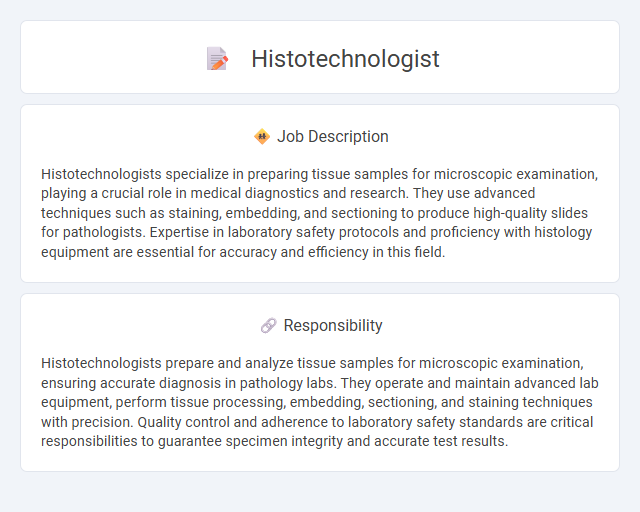
Histotechnologists specialize in preparing tissue samples for microscopic examination, playing a crucial role in medical diagnostics and research. They use advanced techniques such as staining, embedding, and sectioning to produce high-quality slides for pathologists. Expertise in laboratory safety protocols and proficiency with histology equipment are essential for accuracy and efficiency in this field.
Individuals with strong attention to detail and a steady hand may be well-suited for a histotechnologist role, as the job involves preparing tissue samples for microscopic examination. Those who can work independently and handle routine, repetitive tasks with precision might find this career suitable. However, people who prefer high social interaction or dynamic work environments may find this role less fitting.
Qualification
Histotechnologists require a bachelor's degree in histotechnology, biology, or a related life science field, with certification from the American Society for Clinical Pathology (ASCP) being highly preferred. Strong knowledge of tissue processing, embedding, microtomy, and staining techniques ensures accuracy in preparing samples for microscopic examination. Advanced skills in handling laboratory equipment and understanding of pathology principles are essential for precise diagnosis and research support.
Responsibility
Histotechnologists prepare and analyze tissue samples for microscopic examination, ensuring accurate diagnosis in pathology labs. They operate and maintain advanced lab equipment, perform tissue processing, embedding, sectioning, and staining techniques with precision. Quality control and adherence to laboratory safety standards are critical responsibilities to guarantee specimen integrity and accurate test results.
Benefit
Histotechnologists likely enjoy the benefit of working in a specialized field within medical laboratories, which can lead to strong job stability and demand. Their expertise in tissue analysis may provide opportunities for career advancement and involvement in cutting-edge medical research. Competitive salaries and the potential for contributing to critical diagnostic processes could also be significant advantages of this profession.
Challenge
A Histotechnologist job likely involves complex challenges in preparing tissue samples for microscopic examination, requiring precision and attention to detail to avoid compromising diagnostic results. The role probably demands adapting to advances in staining techniques and laboratory technology, which may present ongoing learning curves. Managing time efficiently in high-pressure environments is also expected to be a significant challenge in this position.
Career Advancement
Histotechnologists specialize in preparing tissue samples for microscopic examination, playing a critical role in medical diagnostics by ensuring the accuracy of pathology results. Career advancement opportunities include moving into supervisory roles, such as lead technologist or lab manager, and pursuing certifications like Histotechnologist (HTL) or Histotechnician (HT), which enhance professional credentials and salary potential. Further growth can be achieved through continuing education or specializing in molecular diagnostics, cytotechnology, or research, expanding expertise and opening pathways to roles in clinical research or pathology consultation.
 kuljobs.com
kuljobs.com